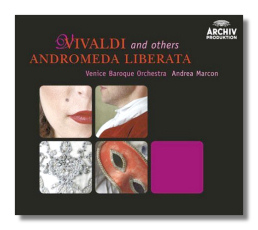
The Internet's Premier Classical Music Source
Related Links
- Vivaldi Reviews
- Latest Reviews
- More Reviews
-
By Composer
-
Collections
DVD & Blu-ray
Books
Concert Reviews
Articles/Interviews
Software
Audio
Search Amazon
Recommended Links
Site News
 CD Review
CD Review
Antonio Vivaldi, et al (?)

Andromeda liberata
- Simone Kermes (Andromeda)
- Max Emanuel Cencic (Perseo)
- Katerina Beranova (Cassiope)
- Anna Bonitatibus (Meliso)
- Mark Tucker (Daliso)
La Stagione Armonica
Venice Baroque Orchestra/Andrea Marcon
Archiv 477098-2 DDD 2CDs: 5128, 46:37
This is an example of a serenata, or "serenade" – in this context, a hybrid between a cantata and an opera. Usually intended to be performed in the evening hours, it is an open-air work, often composed for use during an important occasion. In this case, the authorship of Andromeda liberata is in question. It may have been entirely the work of Antonio Vivaldi; the aria "Sovvente il sole" is almost certainly his, but the composer(s) of the rest of the serenata cannot be definitively established. It is possible that the serenata might be what is known as a pasticcio, or an assemblage of music by several composers. In the booklet note, a case is made for both possibilities, but without coming to any conclusions.
The story, in brief, comes from Greek mythology, and concerns Andromeda, the daughter of Cassiopeia, who has been freed by Perseus from the rock where she has been chained. Cassopeia has promised Andromeda to Perseus as a reward. For her part, Andromeda is grateful, but she initially refuses Perseus because she is in love with Daliso. In time, however, she learns that Daliso is incapable of love, and she willingly accepts Perseus, thereby allowing the serenata to end with rejoicing. It is likely that Andromeda liberata was composed for a happy event, possibly the return of the exiled Cardinal Ottoboni to his native Venice.
Listening to Andromeda liberata for the first time, my ear immediately picked out "Sovvente il sole," an extended aria for Perseo in the second half, as definitely the work of Vivaldi. With its melancholy fluency, no one else could have written it. The rest of the score is Vivaldian too, although not to this degree. Some of the choral writing sounds more characteristic of Handel (who came along a few years later)… but only from time to time. One can also point to portions of the score that sound like something Vivaldi might have written, but earlier than 1726 – the date on the manuscript score. On the other hand, Vivaldi's ornate writing for solo voices is much in evidence. Andromeda liberata is something of a mystery then, and we owe it to musicologist Olivier Fourés, who also wrote the booklet note, that this music has been brought to light, even if its provenance remains questionable.
It is often remarked that "great" opera singers are much rarer now than just a few decades ago. I've concluded, however, that that today's singers are no less worthy than their forebears… it's just that they've become more specialized. There's no dearth of impressive singing on this CD, and the performances are as authentic and stylish as one could wish for. Max Emanuel Cencic is a male soprano with a head-turning voice, but all of the singers get their chance to shine. Marcon, who made several fine recordings for Sony Classical, now has an exclusive contract with Archiv, and I'm looking forward to the new discoveries that the coming years will bring. Andromeda liberata is quite a find, and this première recording is not likely to be bettered anytime soon, if at all.
Copyright © 2005, Raymond Tuttle



















